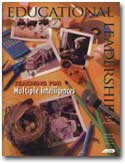Funding for Justice
Funding for Justice: Money, Equity, and the Future of Public Education, edited by Stan Karp, Robert Lowe, Barbara Miner, and Bob Peterson.
School finance and equity may be the most defining public policy issues we face as a nation, in the view of these four author-editors. Their book gives parents, activists, educators, and policymakers the facts and resources they need to address these critical issues in their own communities. The contributions include Stan Karp on "Equity Suits Clog the Courts"; Jonathan Kozol's views on Savage Inequalities, Harvey Kantor on "Equal Opportunity and the Federal Role in Education," and Robert Slavin on "Where Should the Money Go?"
Funding for Justice also features an overview of major court cases on state funding; an explanation of why more money, though critical, isn't the sole answer to transforming our schools; and a look at the increased influence of private fund-raising. A special section details the political and legal history of school funding in each state.
The book is available from Rethinking Schools Ltd., an independent, nonprofit publisher of educational materials that was founded by educators in 1986. The group produces a quarterly journal, Rethinking Schools. Contact Rethinking Schools Ltd. at 1001 E. Keefe Ave., Milwaukee, WI 53212; (414) 964-9646 (e-mail: rethink@excepc.com). 1997. 82 pp., Paperbound. $5 plus $3.50 shipping and handling. Discounts on bulk orders.
Healthy Teens
Healthy Teens: Success in High School and Beyond, Alice R. McCarthy.
This comprehensive guide for parents of high school students has been produced as part of the Michigan Model for Comprehensive School Health Education. The nationally recognized program is being used voluntarily in 93 percent of Michigan public school districts and in more than 200 private schools. Among the dozens of topics are teen development, parent-teacher partnerships, jobs, exercise and nutrition, eating disorders, ADHD, depression and suicide, substance abuse and alcohol, sexual issues, crime and sexual assaults, and gangs, violence, and abusive relationships.
Available from Bridge Communications, Inc., 1450 Pilgrim Rd., Birmingham, MI 48009; (810) 646-5583 (e-mail: bridgecomm@aol.com). Internet: http://bridge-comm.com. 1996. 94 pp., Paperbound. $5.95 plus shipping.
Learning Experiences in School Renewal
Learning Experiences in School Renewal: An Exploration of Five Successful Programs, edited by Bruce Joyce and Emily Calhoun.
These case studies of school systems attempting to become true learning communities make clear that the culture of schools must change to where learning is the central focus. The five programs—none of which is specifically identified—include two staff development initiatives, one in an inner-city and the other in a county school district in the Southeast; a program exploring governance structures; a district's program to build a culture of readers and writers; and an "action network" focusing on research.
Available from ERIC Clearinghouse on Educational Management, 5207 University of Oregon, Eugene, OR 97403-5207; (541) 364-5044. 1996. 208 pp., Paperbound. $14.50 plus $4 for shipping and handling.
The State of America's Children Yearbook 1997
The State of America's Children Yearbook 1997, Children's Defense Fund.
In this annual report, the Children's Defense Fund marshals thousands of facts to show that for millions of U.S. children, the educational outlook is bleak. Data released in 1996, for example, show that the gradual increase in the number of young people who graduate from high school has stopped, and that 20 years of progress in closing the academic gap between both low-income students and students of color and others has not only stopped but has reversed itself—the gap is now growing.
The Defense Fund holds the schools responsible. In particular, the authors observe that schools serving Hispanic, black, and low-income students "tend to have the fewest well-qualified teachers, the most watered-down curriculums, the fewest basic resources, and the lowest standards for student performance."
The report also examines food and nutrition, crime and violence, families in crisis, adolescent pregnancy prevention, and youth development. The appendix compares detailed statistics in each area by state.
Available from Children's Defense Fund publications, 25 E St. N.W., Washington, DC 20002; (202) 628-8787. 1997. 120 pp., Paperbound. $14.95 plus $3 for shipping and handling.
